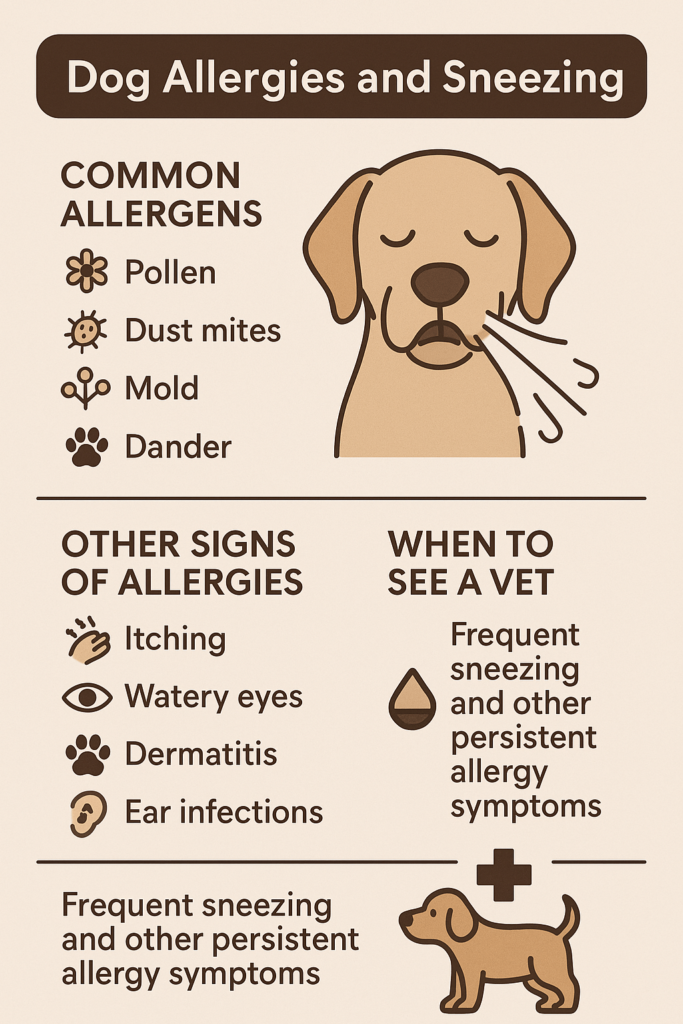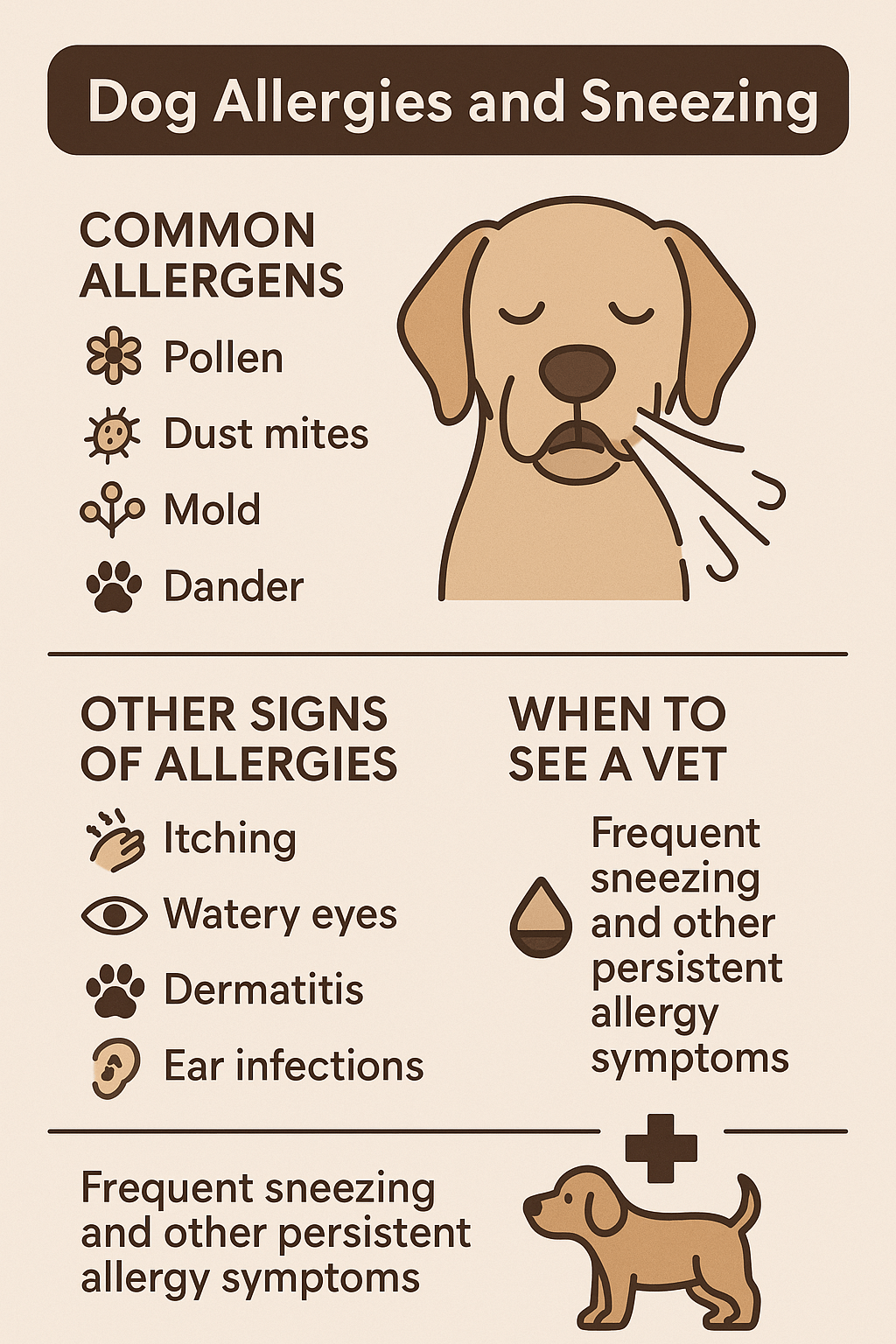Dog Allergies and Sneezing: What You Need to Know
Does your dog sneeze more often than usual? While occasional sneezing is normal, frequent or persistent sneezing could indicate an underlying issue, such as allergies. Dog allergies are a common concern among pet owners, and sneezing is one of the many symptoms that can signal discomfort or irritation. Whether it’s caused by environmental factors, food sensitivities, or seasonal changes, understanding the root cause of your dog’s sneezing is crucial for their well-being. In this blog post, we’ll explore the causes, symptoms, and solutions for dog allergies and sneezing to help you keep your furry friend happy and healthy.
Understanding Seasonal Allergies in Dogs
“Seasonal allergies are different from year-round environmental allergies and food allergies, because symptoms are observed only during specific times of the year, depending on what the dog is allergic to and when the specific allergens are prevalent in the environment.”
Common Causes of Dog Allergies and Sneezing
Sneezing in dogs is often linked to allergies, but identifying the exact cause can be challenging. Here are some of the most common triggers that may lead to allergic reactions and sneezing in dogs.
Environmental Allergens:
Pollen, dust mites, mold spores, and grass can irritate your dog’s respiratory system and nasal passages, leading to sneezing.Household Irritants:
Cleaning products, perfumes, cigarette smoke, and air fresheners can trigger sneezing episodes in sensitive dogs.Food Allergies:
Certain ingredients like beef, chicken, dairy, or wheat may cause allergic reactions that manifest as sneezing or other symptoms.Flea Allergy Dermatitis:
Flea bites can cause severe itching and inflammation, which may indirectly lead to sneezing if your dog rubs their face excessively.Seasonal Changes:
Spring and fall bring higher pollen counts, making these seasons particularly problematic for allergy-prone dogs.
Understanding these potential triggers is the first step toward addressing your dog’s sneezing and ensuring their comfort.

Signs Your Dog May Have Allergies
Sneezing isn’t the only symptom of dog allergies. Recognizing additional signs can help you determine whether your dog is suffering from an allergic reaction.
Itchy Skin or Paws:
Dogs with allergies often scratch, chew, or lick their skin excessively, especially around the paws, ears, and belly.Watery Eyes:
Red, irritated, or teary eyes are common signs of allergies and may accompany sneezing episodes.Runny Nose:
A clear discharge from the nose, combined with sneezing, can indicate an allergic response to environmental irritants.Ear Infections:
Allergies can make your dog’s ears itchy and inflamed, increasing the risk of ear infections.Gastrointestinal Issues:
Food allergies may cause vomiting, diarrhea, or gas in addition to sneezing and skin irritation.
If your dog exhibits multiple symptoms, it’s important to consult your veterinarian for proper diagnosis and treatment.
Check this guide 👉Does Honey Help with Dog Allergies? Best 7 Expert Tips!
Check this guide 👉Dog Allergy Testing: Best 7 Expert Tips!
Check this guide 👉Essential Oils for Dog Allergies: Best 7 Expert Tips!
Common Allergy Triggers | Symptoms to Watch For |
|---|---|
Pollen, dust, and mold | Sneezing, watery eyes, runny nose |
Flea bites | Itchy skin, hair loss, redness |
Certain foods (e.g., beef, dairy) | Vomiting, diarrhea, sneezing |
Household chemicals | Coughing, sneezing, respiratory issues |
Seasonal weather changes | Increased sneezing during spring/fall |
How to Manage Dog Allergies and Reduce Sneezing
Managing your dog’s allergies effectively requires a combination of prevention, care, and professional guidance. Here are practical steps you can take to minimize sneezing and improve your dog’s quality of life.
Identify and Avoid Triggers:
Work with your vet to pinpoint specific allergens and remove them from your dog’s environment whenever possible.Use Air Purifiers:
High-quality air purifiers can reduce airborne allergens like pollen, dust, and pet dander in your home.Regular Grooming:
Bathe your dog regularly using hypoallergenic shampoos to remove allergens trapped in their fur.Switch to Hypoallergenic Food:
If food allergies are suspected, try feeding your dog a limited-ingredient or hypoallergenic diet recommended by your vet.Administer Medications:
Antihistamines, steroids, or allergy shots may be prescribed to alleviate symptoms and provide relief.
With consistent management, you can significantly reduce your dog’s sneezing and allergy-related discomfort.
Preventive Measures to Keep Your Dog Allergy-Free
Prevention is key to minimizing the impact of allergies on your dog’s health. Taking proactive steps can help reduce the frequency and severity of sneezing episodes.
Keep Your Home Clean:
Vacuum carpets, wash bedding, and dust surfaces regularly to eliminate allergens from your living space.Limit Outdoor Exposure During Peak Seasons:
Keep your dog indoors during high-pollen days or when grass is freshly cut to prevent exposure to irritants.Check for Fleas Regularly:
Use flea prevention products year-round to protect your dog from flea bites and related allergies.Provide Fresh Water Daily:
Hydration supports overall health and helps flush out toxins that may exacerbate allergic reactions.Monitor New Foods Carefully:
Introduce new foods gradually and observe your dog for any adverse reactions before making permanent dietary changes.
By implementing these preventive measures, you can create a safer and more comfortable environment for your dog.
Natural Remedies for Dog Allergies
If you prefer natural approaches to managing your dog’s allergies, consider these remedies that may complement traditional treatments.
Coconut Oil:
Adding a small amount of coconut oil to your dog’s food can reduce inflammation and soothe itchy skin.Apple Cider Vinegar:
Diluted apple cider vinegar sprayed on your dog’s coat can repel fleas and relieve skin irritation.Omega-3 Fatty Acids:
Fish oil supplements rich in omega-3s promote skin health and reduce allergy-related inflammation.Probiotics:
Probiotic supplements support gut health, which plays a role in managing food allergies and boosting immunity.Herbal Teas:
Mild herbal teas like chamomile can be applied topically to calm irritated skin or offered in small amounts to reduce stress.
While natural remedies can help, always consult your vet before introducing new treatments.
Seasonal Allergies in Dogs: What to Expect
Seasonal allergies are a common source of sneezing in dogs, especially during spring and fall. Understanding what to expect can help you prepare and respond effectively.
Increased Sneezing in Spring:
Blooming flowers and trees release pollen, triggering sneezing and nasal congestion in sensitive dogs.Grass and Weed Allergies in Summer:
Dogs playing in grassy areas may develop allergies to grass or weed pollens, leading to sneezing and itchiness.Fall Mold Spores:
Damp leaves and decaying vegetation harbor mold spores, which can irritate your dog’s respiratory system.Temperature Fluctuations:
Sudden changes in temperature can dry out nasal passages, causing sneezing fits.Preventive Measures:
Wipe your dog’s paws and coat after outdoor play to remove allergens and reduce exposure.
By anticipating seasonal challenges, you can better manage your dog’s allergies year-round.
When Sneezing Isn’t Caused by Allergies
Not all sneezing in dogs is allergy-related. Other conditions can mimic allergy symptoms, requiring different approaches to diagnosis and treatment.
Foreign Objects in the Nose:
Grass seeds, dirt, or small particles lodged in the nasal cavity can cause persistent sneezing and discomfort.Respiratory Infections:
Viral or bacterial infections may lead to sneezing, coughing, and nasal discharge.Nasal Tumors:
Although rare, tumors in the nasal passages can cause chronic sneezing and require veterinary evaluation.Dental Problems:
Infected teeth or gums can affect nearby nasal tissues, resulting in sneezing and bad breath.Reverse Sneezing Episodes:
This harmless condition, characterized by snorting sounds, is often mistaken for sneezing but doesn’t involve allergens.
Understanding these possibilities ensures accurate diagnosis and appropriate care for your dog.
Frequently Asked Questions About Dog Allergies and Sneezing
Why is my dog sneezing so much?
Frequent sneezing in dogs is often caused by allergies, environmental irritants, or foreign objects stuck in their nasal passages.
Can I give my dog antihistamines for allergies?
Yes, but only under veterinary supervision. Not all human antihistamines are safe for dogs, and dosage varies by size and breed.
How do I know if my dog has a food allergy?
Symptoms include itching, gastrointestinal upset, and chronic ear infections. An elimination diet can help identify problem ingredients.
Are certain dog breeds more prone to allergies?
Yes, breeds like Bulldogs, Golden Retrievers, and Terriers are more susceptible to allergies due to genetic predispositions.
When should I see a vet about my dog’s sneezing?
Consult your vet if sneezing persists, is accompanied by other symptoms, or seems painful or distressing for your dog.
Helping Your Dog Breathe Easier
Dog allergies and sneezing don’t have to disrupt your pet’s happiness or your peace of mind. By understanding the causes, recognizing the symptoms, and implementing effective management strategies, you can provide your dog with the care they need to thrive. Remember, every dog is unique, so tailoring solutions to their specific needs is essential. With patience, persistence, and professional guidance, you can ensure your furry companion enjoys a sneeze-free and allergy-managed life.
Do Cats Have Taste Buds? Best 7 Expert Tips! – Discover how cats experience flavors and why their taste is so unique.
Do Dogs Have Taste Buds? Best 7 Expert Tips! – Discover how dogs experience taste, their preferences, and what it means for their diet and health.
Can Cats Taste Sweet? Best 7 Expert Tips! – Discover why cats can’t taste sweetness, how it affects their diet, and tips to keep them healthy and happy.
Can Dogs Taste Sweet? Best 7 Expert Tips! – Discover how dogs perceive sweetness, which foods are safe, and tips to manage their sweet cravings responsibly.





